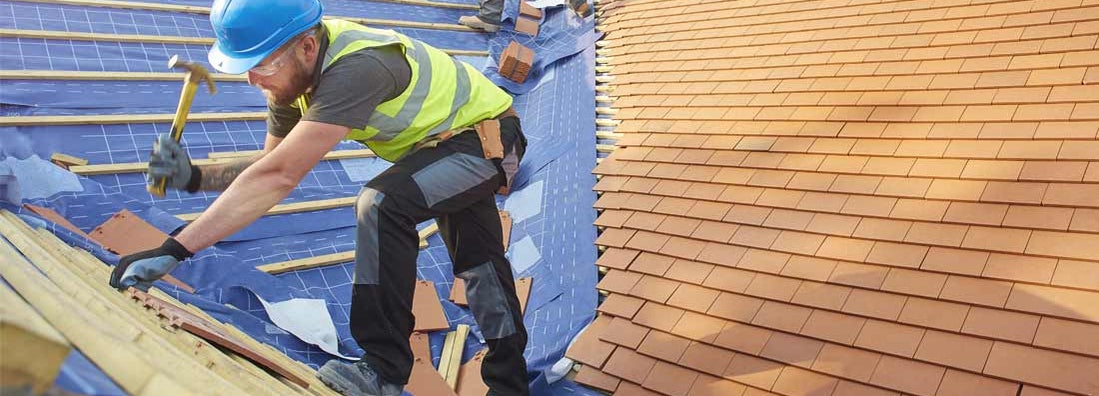Roofers Insurance
Insurance for roofing contractors

You know the risks you face each day as a roofer or roofing contractor. One fall from a roof or ladder can cause severe injuries that could compromise your ability to do your job and earn an income. There are also the risks of property or equipment damage, and injury to your employees or subcontractors and others near the job site. Roofers insurance is critical for you, your liability protection, and the well-being of your business and assets. An independent insurance agent can help you get the protection you need.
The Risks Roofers Face
- Roofers die at a rate of 29.9 deaths per 100,000 full-time workers.
- That's the 5th highest work-related death rate among construction workers.
- That's two times the average of all construction workers, which is 15.2 per 100,000 full-time workers.
- Approximately 50 roofers die each year, mainly from falls.
Important Insurance for Roofers to Consider
Roofing contractor insurance comes in many forms. The specific coverage you will need depends on the nature of your business, whether you hire staff or subcontractors, and whether you work year-round. In colder climates, some roofers only work 8 or 9 months out of the year, and may devote the coldest months to snow removal or other side jobs.
Your business is unique, and the combination of coverage that makes up your roofing contractor insurance portfolio should be tailored to you.
Here's a quick overview of several different types of business insurance coverage you may want to consider.
- Business owners policy or BOP: This is a combination of coverages designed for the small business owner. You may receive discounts if you bundle some of the coverages together.
- General liability: This insurance covers third party property damage or bodily injury to non-employees.
- Professional liability: This coverage may be appropriate for your business if you consult with customers and recommend specific products or treatments. It's designed to protect you from the high cost of legal claims if advice or recommendations you provide result in loss to your customer.
- Workers compensation: Workers comp insures your employees if they become sick or injured in a work-related incident, and can provide lost wages if they can not continue working. Depending on the state and the number of employees you have, you may or may not be required to buy workers comp.
- Commercial vehicle policy: Protects your cars, trucks, vans and specialized trucks and trailers utilized in your roofing business.
- Product liability insurance: If you sell products in your work, you may want to protect yourself against the liability risks if one of the products causes a customer's injury or other loss.
General Liability Insurance for Roofing Contractors
Now let's examine the details of a general liability or roofers liability policy. It would protect your business in these six areas:
- Bodily injury: Protects you if anyone is physically injured at your place of business, or if you or an employee are responsible for injury to a non-employee at a job site
- Personal injury: Covers any damage to the reputation or rights of another person or business; includes issues like slander, libel, copyright infringement, privacy, wrongful arrest or eviction
- Advertising injury: Covers any claims of loss by your customers due to a product or service you advertised
- Medical payments: Covers the medical expenses of someone injured on your property regardless of fault; this coverage can work as a "good will" gesture to avoid a lawsuit
- Independent contractors liability: Covers any damage caused by an independent contractor that you hired
What Is Business Owners Insurance?
Business owners insurance, sometimes referred to as a "BOP," is designed for small businesses that do up to $5 million in sales and have less than 100 employees. A BOP combines general liability with a few other coverage options.
- Property damage: Covers your property and its contents from damage; includes rented or owned office buildings, warehouses, storage facilities, garages, and other buildings, as well as office equipment, computers, inventory and possibly tools and equipment
- Loss of income or business interruption: Protects your business in the event that a business interruption causes you to cease work and lose income; reimburses you for lost income and operating expenses for up to 12 months or until business can be resumed, whichever is shorter
You may be able to carry just general liability if you are self-employed, do not have payroll expenses and do not lease or own a business building.
What Other Coverages Make Sense for a Roofer?
As a roofer or roofing contractor, here are a few more options you may want to consider, depending on your concerns and the nature of your work. Sometimes these can be added to the business owners policy or you can purchase them as stand-alone coverages.
- Tools and equipment floater: This can normally be added to your property damage coverage. It covers any leased or owned specialized tools and equipment for your roofing business.
- Inland marine insurance: This insures your tools and equipment while they are being transported from jobsite to jobsite. It is especially important if you store your tools and equipment in your truck or other vehicle.
- Commercial vehicle insurance: This covers all your cars, trucks, vans, specialized trucks (bucket truck, flatbed truck, dump truck etc.) used for business purposes.
- Work performance bonds: While these are not strictly insurance policies, bonds provide a work guarantee and may be required, particularly if you do commercial or municipal roofing jobs.
